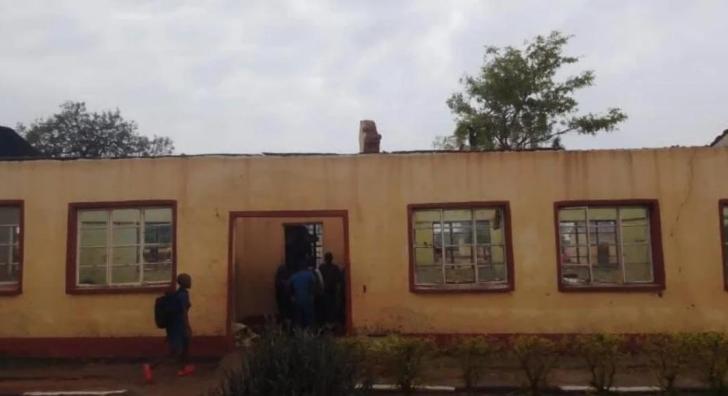News / National
Disaster as rains destroy over 25 schools in Masvingo
23 Nov 2024 at 14:02hrs |
3 Views

Heavy rains that swept across Masvingo province in recent weeks have caused widespread damage, with 25 schools in the region either having their classrooms or teachers' houses destroyed. The destruction is particularly severe in districts such as Chivi, Chiredzi, and Bikita, where both the education sector and local communities are grappling with the aftermath.
In Bikita District, six schools were affected, according to District Schools Inspector (DSI) James Mahofa. The schools impacted include Chikwira High, Marirangwe High, Chinyamapere, Runhengu, Mudzami, and Negovanhu Primary. Mahofa confirmed that while some classroom blocks had their roofs blown off, no casualties were reported as the damage occurred during the night when students were not on the premises. "The schools are already working towards refurbishing the damaged structures, and learning continues despite the setbacks," Mahofa said.
However, some locals reported further disruptions. At one of the schools in the district, solar panels that powered the school's water pumping system were destroyed, leaving the school without access to water.
In Chiredzi District, six schools were impacted, namely Gurungweni, Gwerima, Romwe, Banga Primary, and Chiyambiro and Jerezi Secondary Schools. DSI Micho Hove confirmed that while there were no casualties, access to some schools was disrupted. "Access was particularly challenging at Chiyambiro, where two blocks were severely damaged. At Gwerima, all three classroom blocks and staff quarters lost their roofs," Hove said.
The most affected district in the province was Chivi, traditionally one of the driest areas in Masvingo. Eleven schools were impacted, including Chamatutu, Mavande, Zvifunzi, Madzivire, Berejena, Makamure, Mushai, Gororo Primary Schools, and Berejena, Danhamombe High, and Nyahombe Secondary Schools. The district, which already faces water scarcity issues, is now grappling with the added challenge of infrastructure destruction.
In Masvingo District, only two schools, Victoria High and Mapanzure High, were affected. At Victoria High, a hostel had its roof blown off, while Mapanzure experienced damage to six teachers' houses and one classroom block.
The damage to educational infrastructure in Masvingo highlights the vulnerability of the education sector to extreme weather events, particularly during the rainy season. Dr. Takavafira Zhou, an educationist, expressed concern over the lack of preparedness for natural disasters. "Our greatest challenge is natural disaster preparedness. The government must establish rapid response teams for disaster management. This would minimize the effects of such disasters," Dr. Zhou stated.
He further criticized the government for not providing timely assistance to affected communities. "This year we witnessed serious winds and heavy rains destroying schools, properties, shops, and villages. Despite the widespread damage, government intervention has been minimal. It is crucial that the government declare these areas as natural disaster zones to elicit urgent action," Dr. Zhou emphasized.
The situation remains dire, with affected communities and schools hoping for swift government intervention to restore normalcy and address the educational challenges caused by the extreme weather conditions.
In Bikita District, six schools were affected, according to District Schools Inspector (DSI) James Mahofa. The schools impacted include Chikwira High, Marirangwe High, Chinyamapere, Runhengu, Mudzami, and Negovanhu Primary. Mahofa confirmed that while some classroom blocks had their roofs blown off, no casualties were reported as the damage occurred during the night when students were not on the premises. "The schools are already working towards refurbishing the damaged structures, and learning continues despite the setbacks," Mahofa said.
However, some locals reported further disruptions. At one of the schools in the district, solar panels that powered the school's water pumping system were destroyed, leaving the school without access to water.
In Chiredzi District, six schools were impacted, namely Gurungweni, Gwerima, Romwe, Banga Primary, and Chiyambiro and Jerezi Secondary Schools. DSI Micho Hove confirmed that while there were no casualties, access to some schools was disrupted. "Access was particularly challenging at Chiyambiro, where two blocks were severely damaged. At Gwerima, all three classroom blocks and staff quarters lost their roofs," Hove said.
The most affected district in the province was Chivi, traditionally one of the driest areas in Masvingo. Eleven schools were impacted, including Chamatutu, Mavande, Zvifunzi, Madzivire, Berejena, Makamure, Mushai, Gororo Primary Schools, and Berejena, Danhamombe High, and Nyahombe Secondary Schools. The district, which already faces water scarcity issues, is now grappling with the added challenge of infrastructure destruction.
In Masvingo District, only two schools, Victoria High and Mapanzure High, were affected. At Victoria High, a hostel had its roof blown off, while Mapanzure experienced damage to six teachers' houses and one classroom block.
The damage to educational infrastructure in Masvingo highlights the vulnerability of the education sector to extreme weather events, particularly during the rainy season. Dr. Takavafira Zhou, an educationist, expressed concern over the lack of preparedness for natural disasters. "Our greatest challenge is natural disaster preparedness. The government must establish rapid response teams for disaster management. This would minimize the effects of such disasters," Dr. Zhou stated.
He further criticized the government for not providing timely assistance to affected communities. "This year we witnessed serious winds and heavy rains destroying schools, properties, shops, and villages. Despite the widespread damage, government intervention has been minimal. It is crucial that the government declare these areas as natural disaster zones to elicit urgent action," Dr. Zhou emphasized.
The situation remains dire, with affected communities and schools hoping for swift government intervention to restore normalcy and address the educational challenges caused by the extreme weather conditions.
Source - TellZim News
Join the discussion
Loading comments…














































